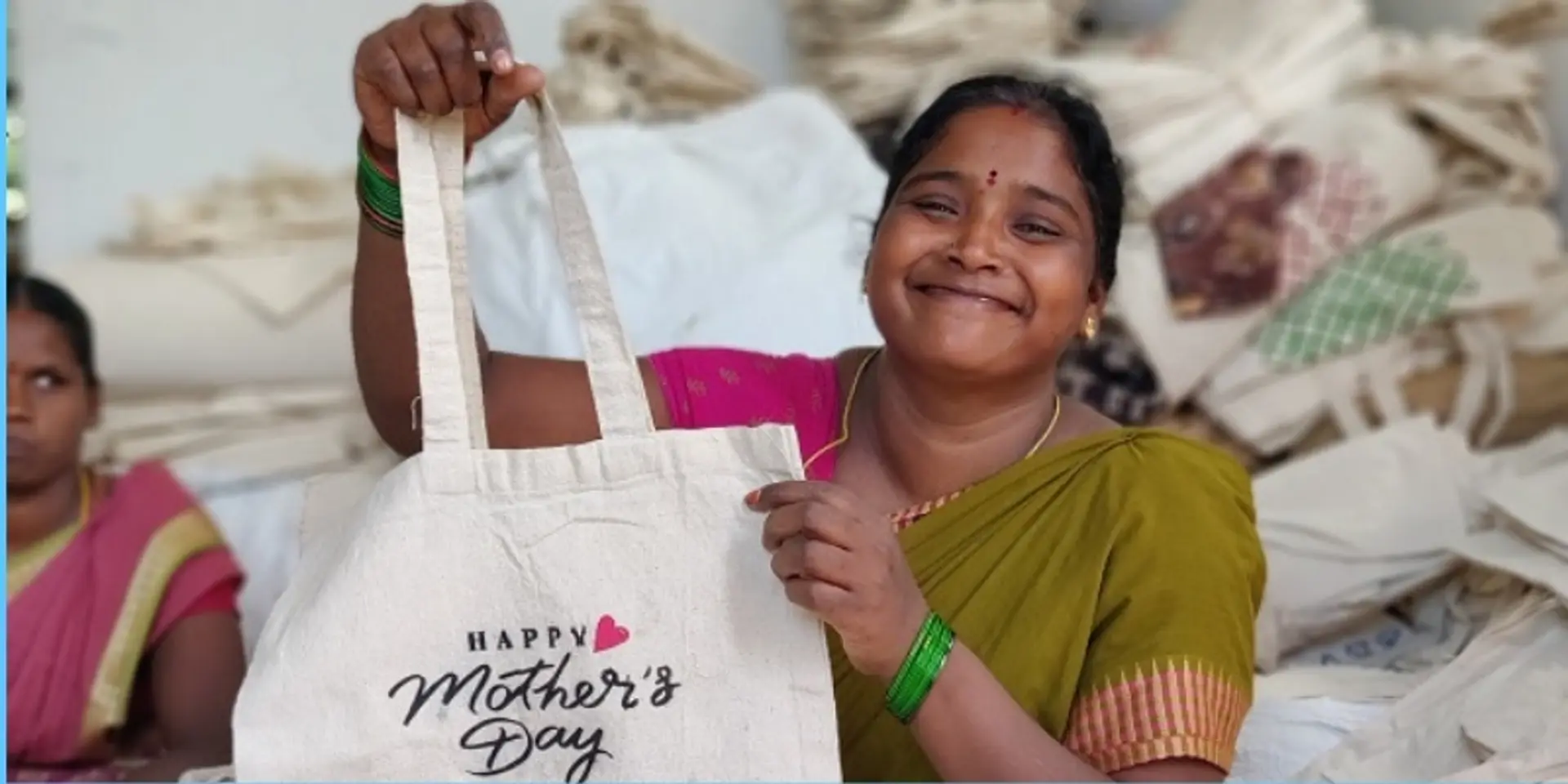Once dealing with drought-driven unemployment these Paalaguttapalle’s Dalit women now have a secure future in the bag
For the 70 Dalit families living in the hamlet the drought of 2010-15 in Rayalaseema had led to great distress, as they were all dependent on agriculture. Now the women of the hamlet sell their handmade cloth bags across India, the US, the UK, and Canada.
Paalaguttapalle, a small hamlet hosting 70 Dalit families, in Andhra’s Chittoor district, is not an easy place to find. A group of women have created a cloth bag business from the hamlet, and while there is no sign announcing their office, their bags have reached far-flung places.

The women of Paalaguttapalle posing with the bags | Source: The News Minute.
The women of Paalaguttapalle have found customers for their handmade cloth bags in the UK, the US and Canada. The line of bags, known as ‘Paalaguttapalle Bag’, has got its own customisable range, which is one of the reasons it has found patrons across the world.
The business sprang from a desperate need for these women to make ends meet when severe drought hit the Rayalaseema belt in 2010-15. The families of this hamlet were completely dependent on agriculture, and the drought forced landowners to convert their land into mangroves. The hamlet had no means of making money.
Aparna Krishnan, a software engineer who was living with the community since 1995, saw how the women scrambled around to find ways to earn a living and support their families.

Aparna Krishnan, the woman who started it all | Source: The News Minute
Also Read: Wedding with a difference: Assamese couple chooses old clothes and books over fancy gift items
Speaking to The News Minute, Aparna said,
“Initially they were making pickles and we were trying to sell it through people we knew. They would also collect gooseberries from the forest, powder them and try to sell that. I saw that the women were extremely capable and began asking people for suggestions. Around three years ago, someone suggested tailoring to us. So, I asked Annapurna (a resident), who had a sewing machine, to make a cloth bag. It turned out well and a friend of mine gave an order for 100 bags for his store in Hyderabad. Annapurna gathered three more women and delivered this order, and that’s how it all started.”
Thus began the journey of the women of Paalaguttapalle in creating world-class cloth bags. In 2017, they truly arrived when they got an order for 1,700 bags for the Organic World Congress in Noida. They made a tidy profit of Rs 5 lakh.
Soon after, they made bags for a handloom expo in Goa in February 2018.

The women cutting fabric required for making the bags | Source: The News Minute
Also Read: Two businessmen give wings to their villagers’ dreams, fly 120 senior citizens for the first time
When it comes to customised bags, Aparna and another women take the orders on behalf of the community. The details for the order - the type of bag, design, quantity and address - are sent to the community’s shared smartphone.
Ranging between Rs 35 and Rs 350, Paalaguttapalle bags are all inexpensive, and come in the form of grocery bags, conference bags, featuring logos, tiffin carry bags for schoolchildren, jewellery pouches, and fancy gift bags, to name a few.

A woman showcasing a bag made by the community | Source: The News Minute
Also Read: Diving deep for a living: Meet Tamil Nadu’s saree-clad women seaweed collectors
The manufacturing of the bags takes place in the women’s office room, where all the fabric is stored. Depending on the order, each woman cuts the fabric into required sizes and then takes it back to her home for stitching.
After the stitching is done, the women gather back in the office where quality check is done. Then, a few of the women go to the nearest village to parcel and send the order. For huge orders, they make a trip to Tirupati to send to the customer’s address.
To market the bags, Aparna made a Facebook page, “Paalaguttapalle Bags – Dalitwada’, where people can view the bags before placing orders.
The Paalaguttapalle women have recently dispatched a huge consignment to an organic farm in the US, and have taken up orders from several engineering colleges in Tamil Nadu. In times like these, the women rope in their counterparts from surrounding villages.
“We are able to earn a decent living now,” Annapurna tells The Hindu.
Speaking about their future plans, Aparna says,
“We want to make Paalaguttapalle Bags famous, for which we must make high-quality, good-looking bags. We are approaching banks for finance to buy more equipment.”
Their latest is a strong vegetable bag that ensures the plump tomatoes are not squished by the heavy potatoes.
Do you have an interesting story to share? Please write to us at [email protected]. To stay updated with more positive news, please connect with us on Facebook and Twitter.


